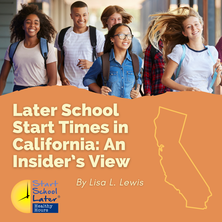 by Lisa Lewis The issue of school start times first hit my radar in the fall of 2015, when my son entered high school. In our community, high school started at 7:30 a.m. But why? Was this the norm elsewhere, too? As a parent and a journalist, I started gathering information and writing about the topic. I also reached out to our district superintendent but got zero response. In the fall of 2016, I wrote about it again, for the Los Angeles Times. While the op-ed gave me a boost of local visibility, there wasn’t any immediate change. Having recently started up a local chapter of Start School Later after connecting with the group during my research, I shifted my focus to seeing what I could accomplish locally. Then, in January 2017, I found out my op-ed had sparked something bigger. State Senator Anthony Portantino, whose district is in Los Angeles, had read it. As it so happened, his daughter’s high school was in the midst of discussing later start times, so it was a topic that resonated with him. He looked into the issue further and decided to introduce a state bill. His office reached out to Start School Later, which agreed to sponsor the bill and looped in the state’s chapter leaders. That bill, SB 328, which proposed 8:30 a.m. as the earliest allowed start time for the state’s middle and high schools, was introduced in February 2017. There had been similar proposed legislation in other states, but nothing of this scope had ever succeeded. Almost immediately, the immensely powerful California Teachers Association, along with the California School Boards Association, decried the bill as overreach that impinged on local control. Meanwhile, the California Parent Teachers Association, focused on the bill’s merits for kids’ well-being, announced its support. The PTA provided key input that helped shape the bill, including having a three-year window to allow enough preparation, as well as clarifying that “zero periods” (optional before-school classes) could still be offered. Drawing on the experience and guidance from Start School Later, several of us in California formed a virtual team: Mariah Baughn and Beth McNeill in San Diego, me in the Los Angeles area, Irena Keller (who’d founded the statewide Start School Later chapter) in the San Francisco Bay Area, and Joy Wake, Sue Gylling and Anne Del Core in Sacramento. Another key player: Stanford sleep specialist Rafael Pelayo, who serves on Start School Later’s Board of Directors. Among our strategies:
Over a two-year period, the bill made it through numerous committees as well as floor votes on both the senate and assembly sides, eventually reaching Gov. Jerry Brown’s desk. All that was needed was his signature. Instead, he vetoed the bill, stating that he believed the decision should be made locally. Luckily, 2019 brought a new governor and another chance. On Feb. 15, 2019. Sen. Portantino brought the bill forth again, with two key amendments: an exemption for the state’s rural districts, and a start-time change for middle schools to “8 a.m. or later” rather than the “8:30 a.m. or later” change for high schools, which provided additional flexibility. This time around, the California PTA signed on as a cosponsor of the bill, which brought additional visibility and resources. Again, the bill made it through all of the previous steps. Gov. Gavin Newsom had thirty days to sign it into law – or veto it, as his predecessor had. There was a final blitz of letters to Newsom’s office. There were final appeals from supporters. And, we knew, there were similar activities opposing the bill underway. Finally, at about 8:30 p.m. on the very last day, Newsom signed it into law. What it finally took: Persistence, allies, communication, timing, flexibility This included:
Ultimately, what we accomplished in California drew on the body of research and many advocacy efforts to date, as well as the active support of countless researchers and the critical connections forged by Start School Later. May it continue to bolster similar efforts elsewhere. Adapted excerpt from The Sleep-Deprived Teen: Why Our Teens Are So Tired, And How Parents And Schools Can Help them Thrive, published by Mango Publishing Group, June 2022. Lisa L. Lewis is the author of The Sleep-Deprived Teen: Why Our Teenagers Are So Tired, And How Parents And Schools Can Help Them Thrive, described as “a call to action” by Arianna Huffington and “an urgent and timely read” by Daniel H. Pink. The book is an outgrowth of her previous work on the topic, including her role helping get California’s landmark law on healthy school start times passed. Lewis has written for The Washington Post, The New York Times, The Atlantic, and others. She’s a parent to a teen and a recent teen and lives in California. More info: www.lisallewis.com.
0 Comments
Your comment will be posted after it is approved.
Leave a Reply. |
 RSS Feed
RSS Feed